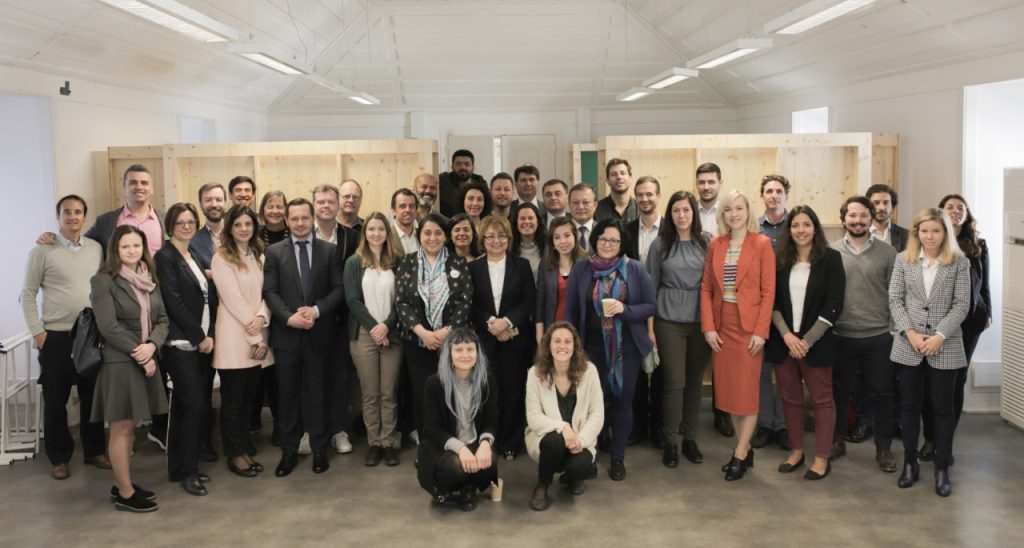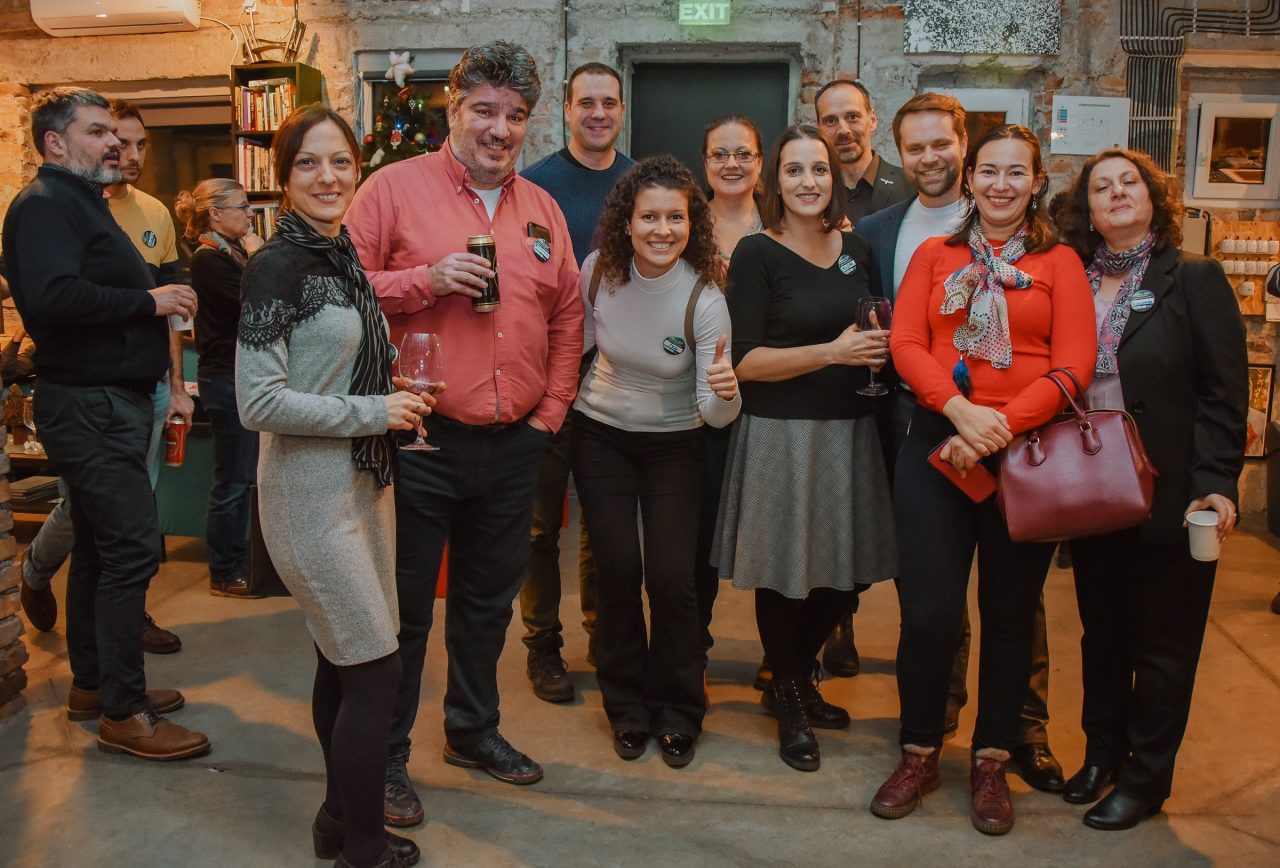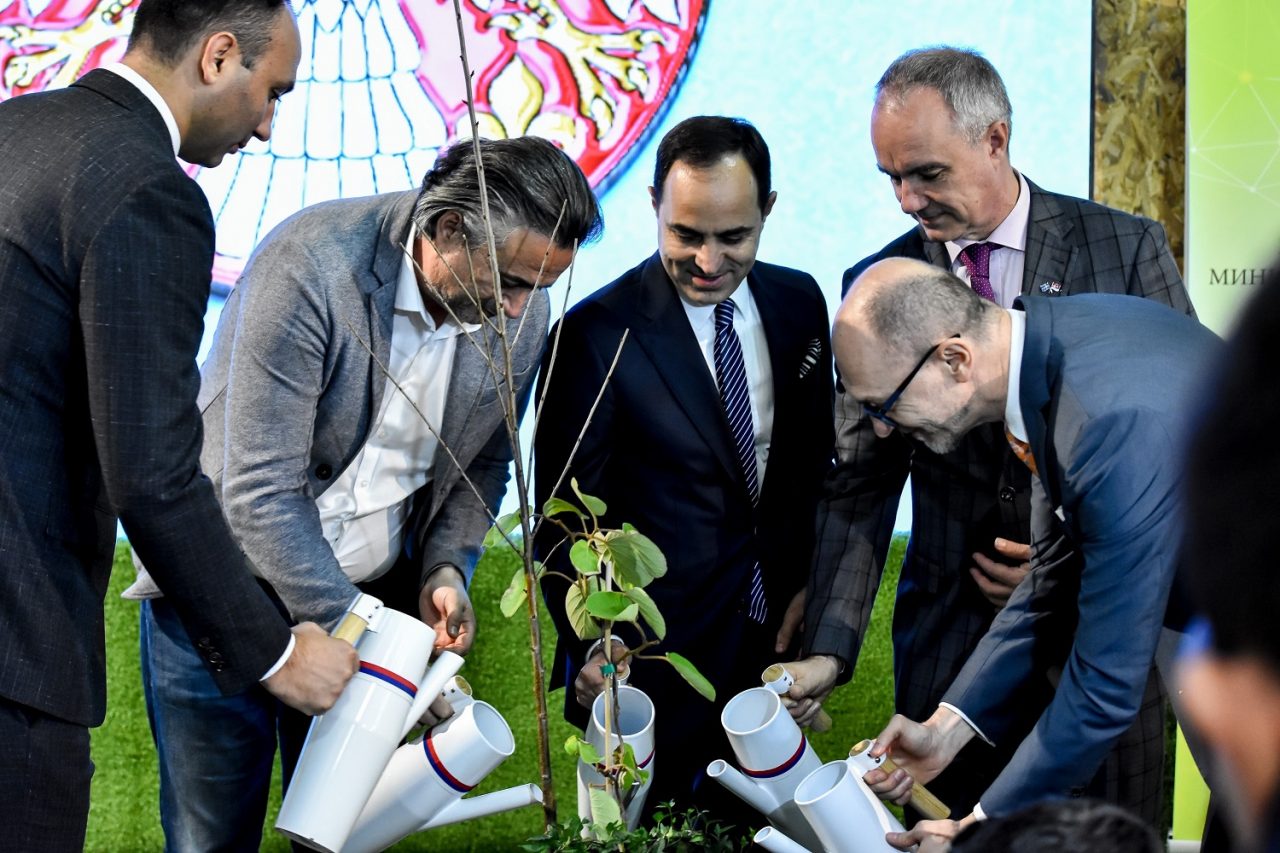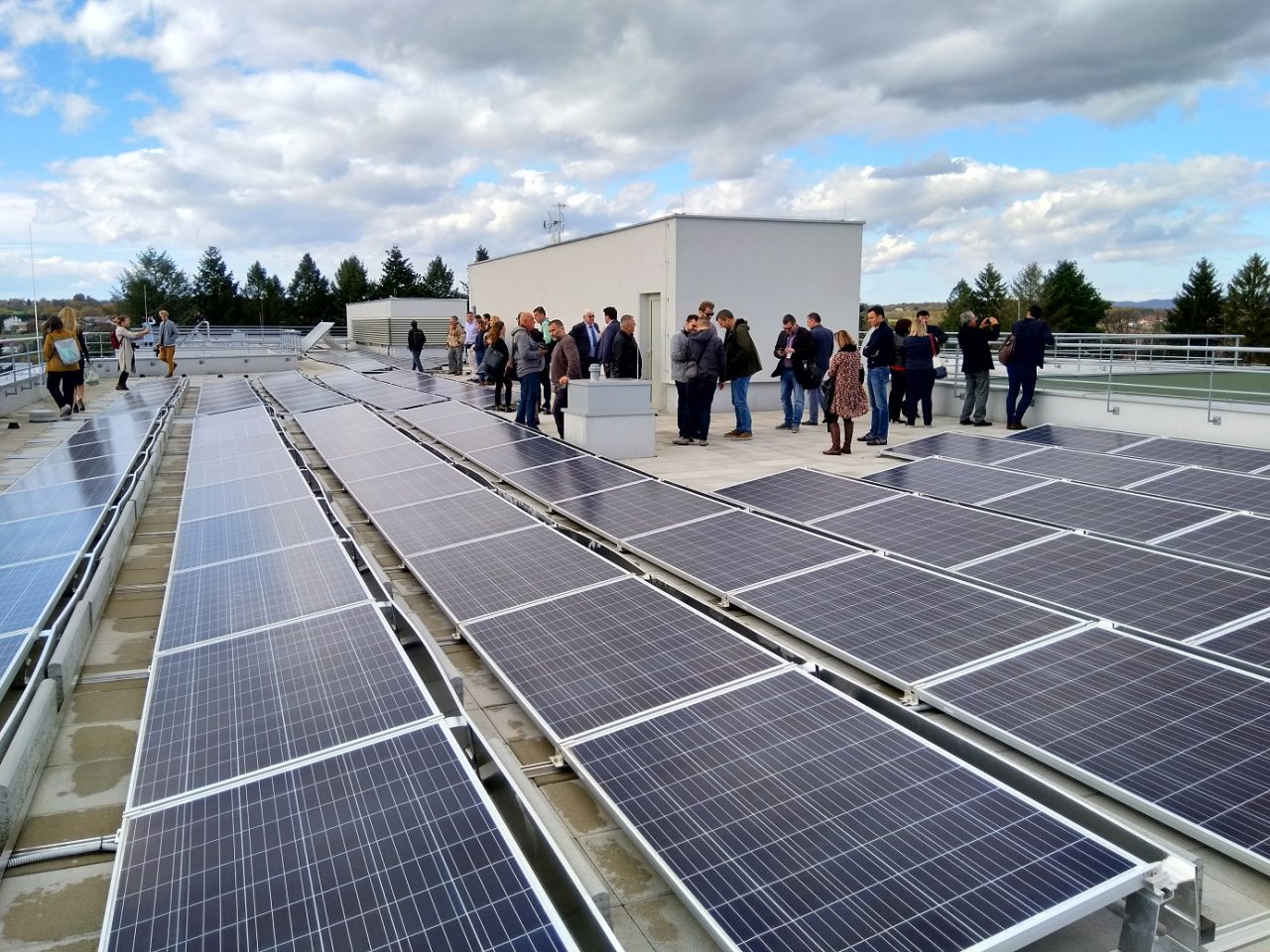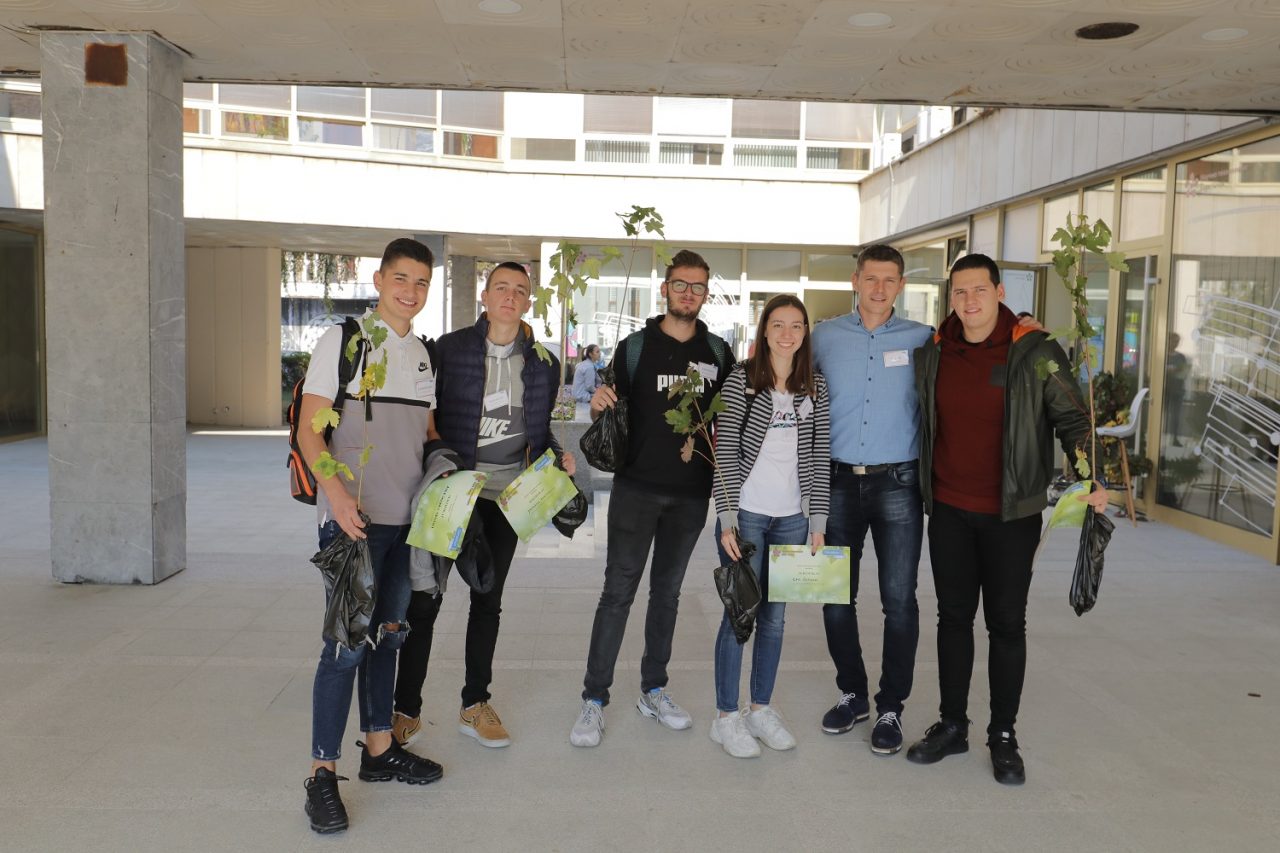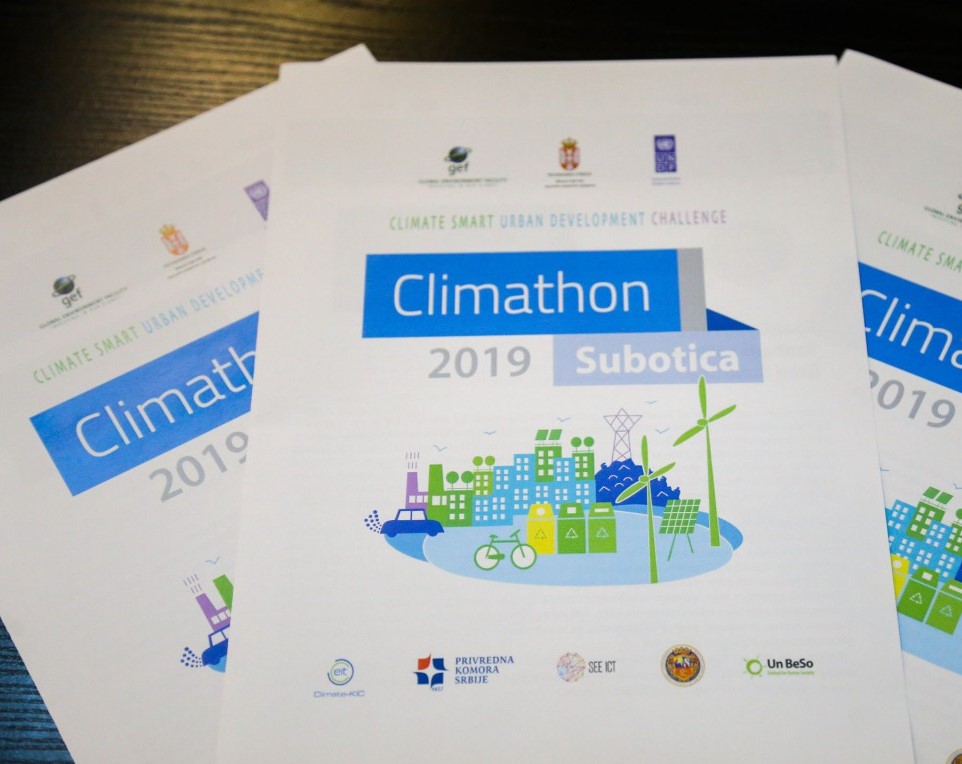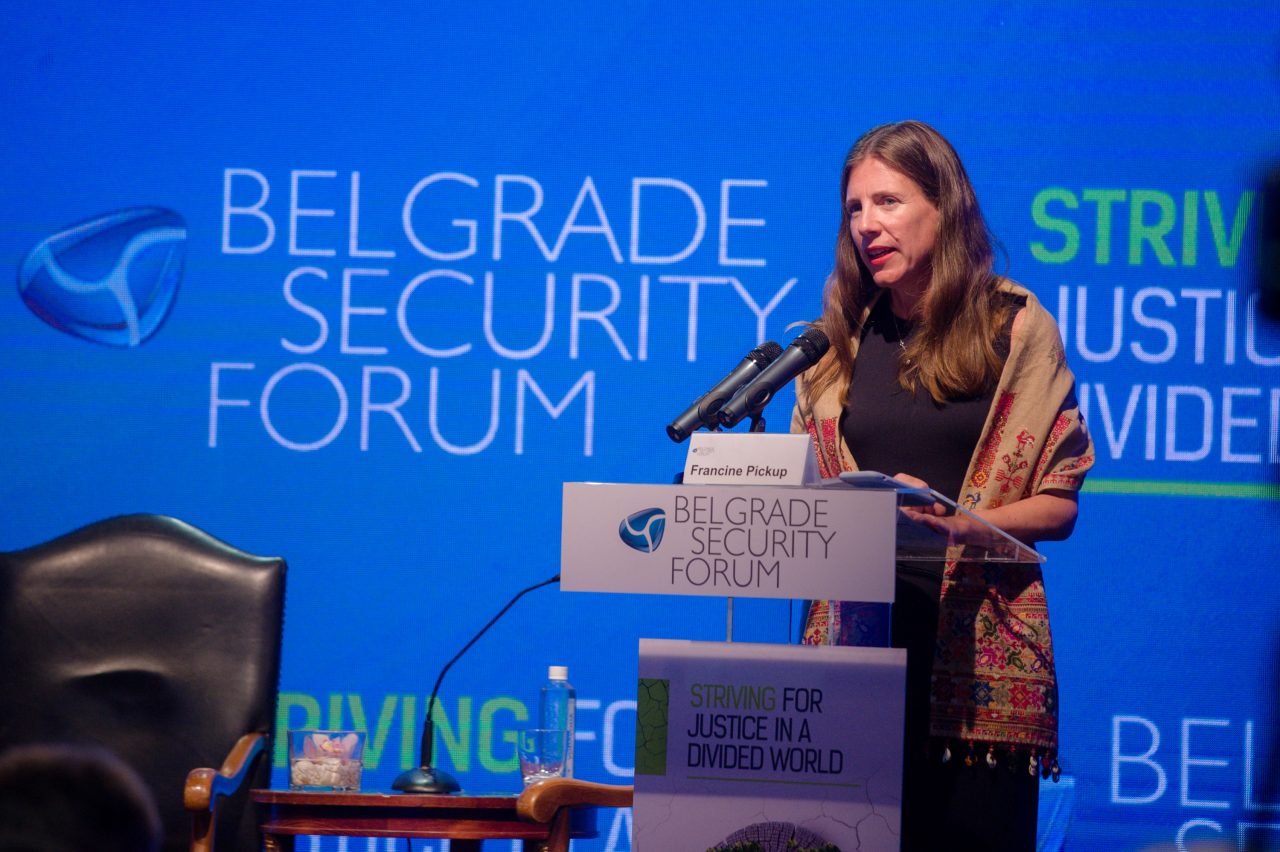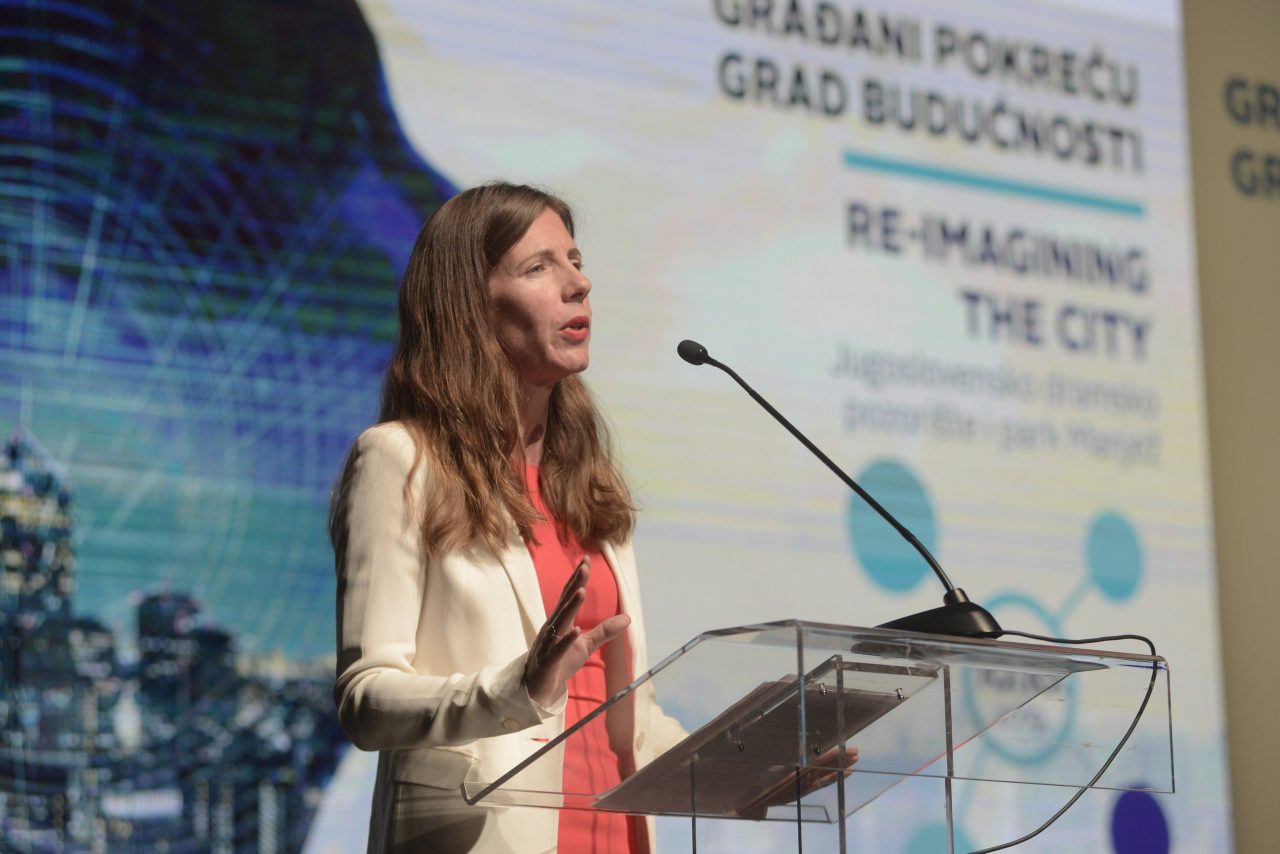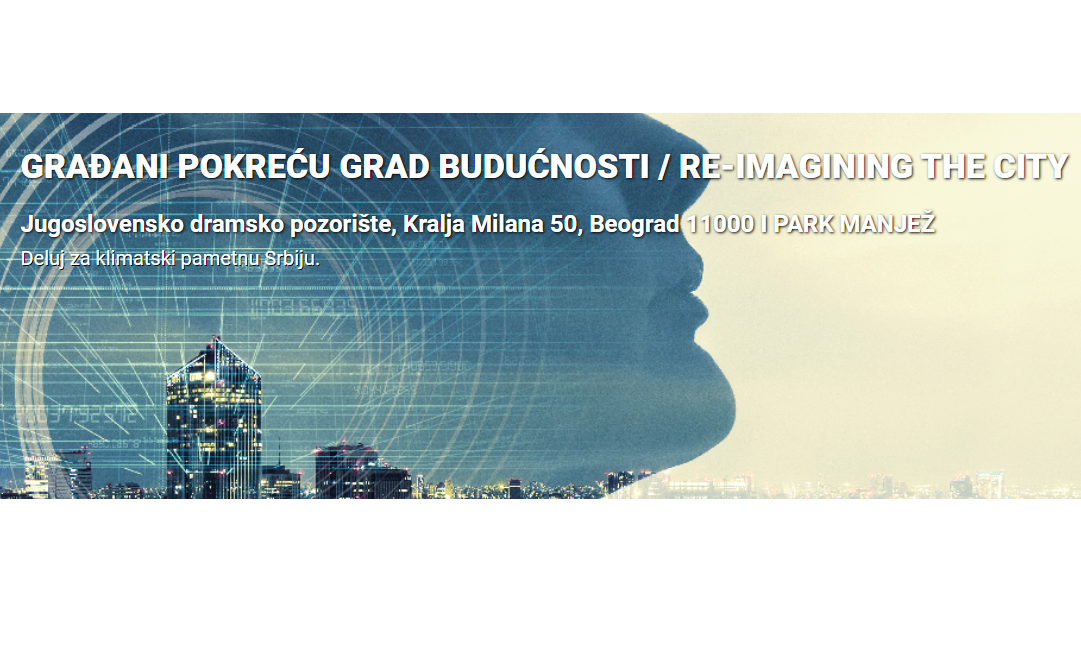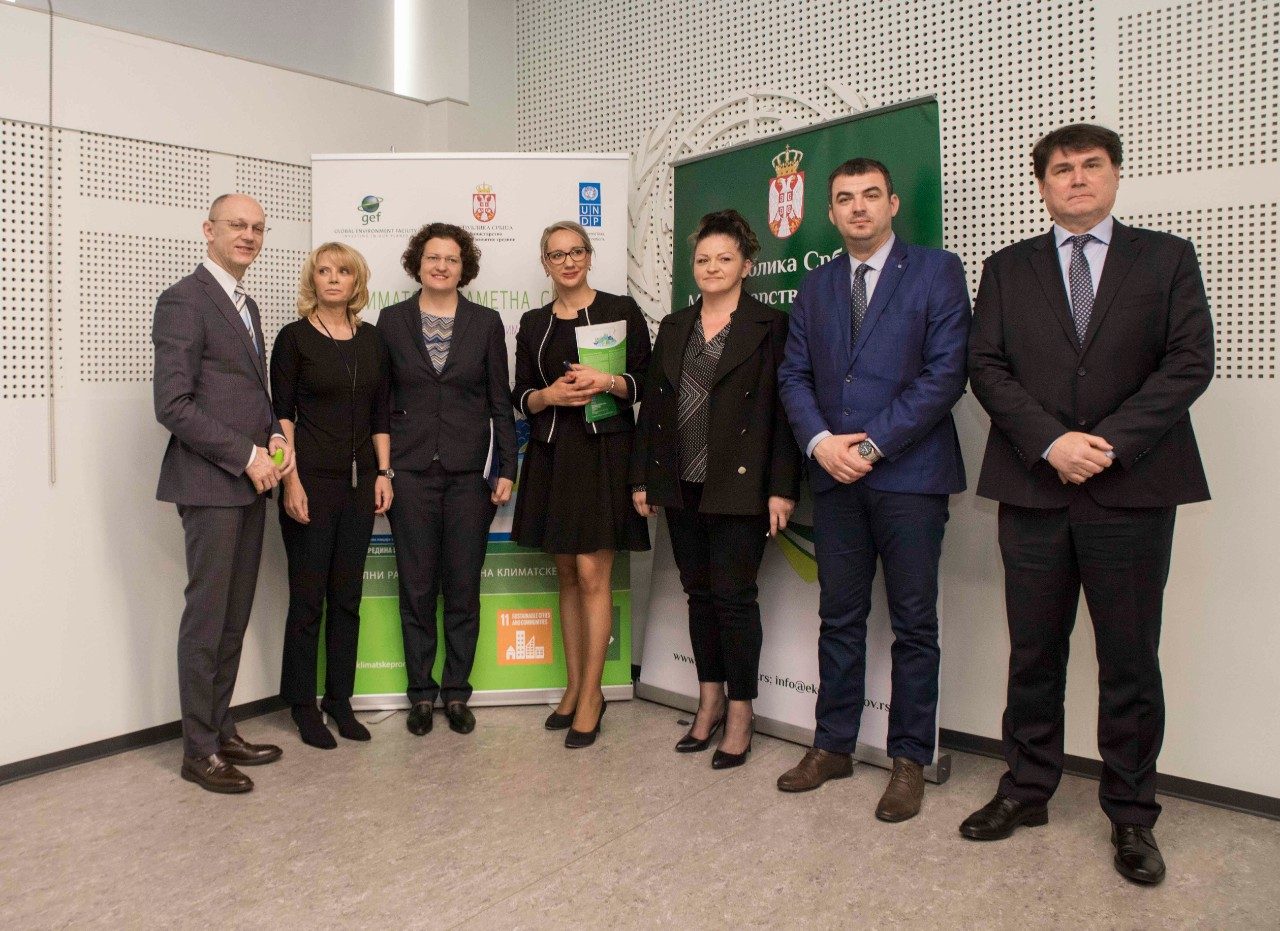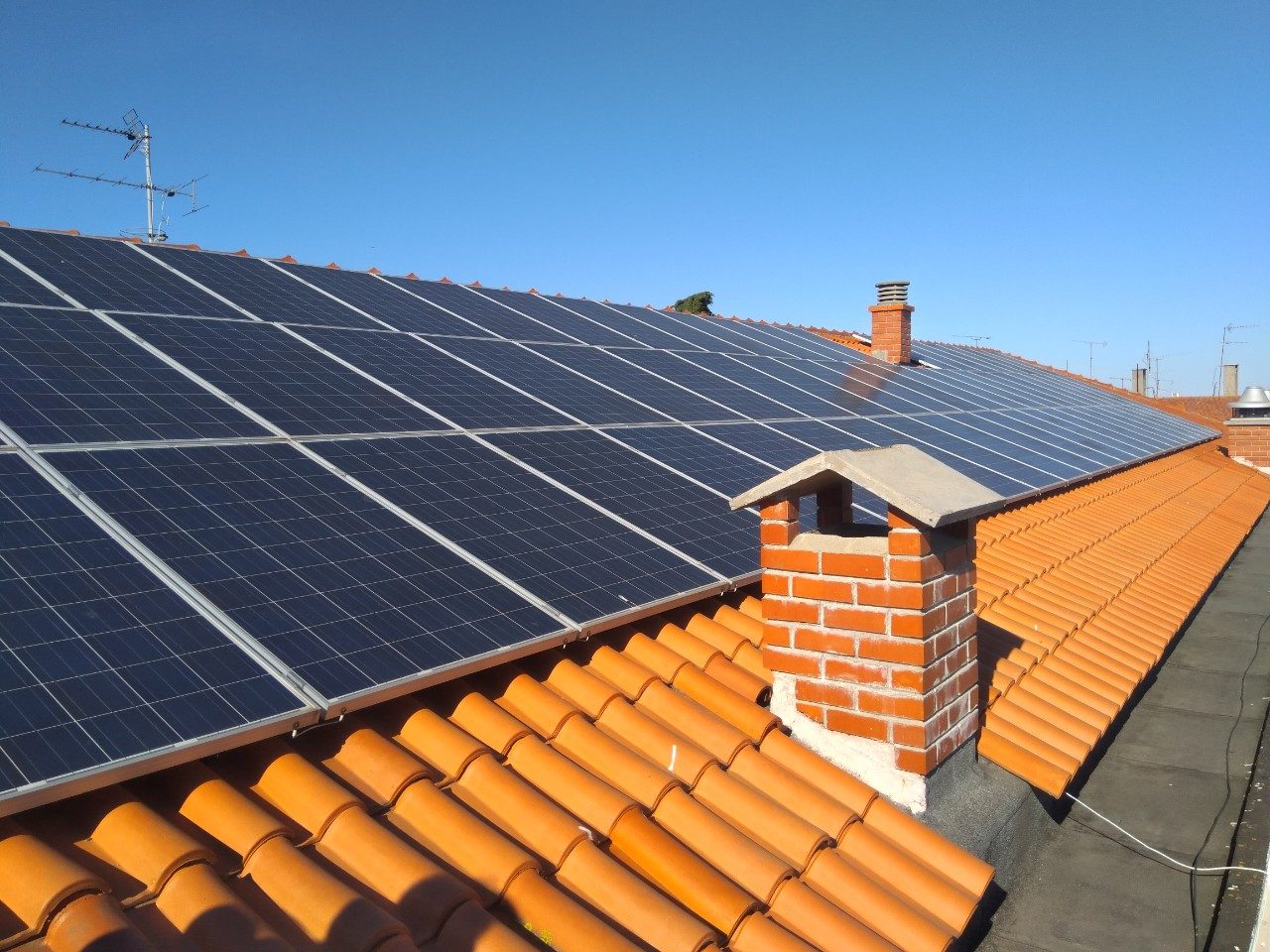-
Dec 19 2019 The Annual Gathering of Climate Change Practitioners was held in Belgrade
More than 80 professionals from various fields in climate change gathered on Friday, December 13th for the annual networking meeting in MARSH Open Space in Belgrade, to present the results achieved on projects in 2019 and announce activities for next year.
– This is the third year that we are organizing such an event in cooperation with the United Nations Development Programme (UNDP), which is important for bringing people together from different programs to discuss, share experiences and plan future projects together. We all work in the same field and our goal is to fight climate change – said Advisor for Circular Economy at the Chamber of Commerce and Industry of Serbia Isabel Arias.
She introduced Climate-KIC, explaining it is the EU largest partnership organization that is supporting innovation that helps tackle climate change to achieve net-zero greenhouse gas (GHG) emissions. According to Arias, the strength of the organization lies in the huge network they have all over Europe in various areas, such as finance, cities, materials and land use, and they will begin to work in the topic of water. Partner organizations are companies, universities, chambers of commerce.
Ana Seke, „Climate Smart Urban Development Challenge“ Project Coordinator at UNDP Serbia, presented the realized activities, including public calls for innovative ideas and solutions, as well as the open data challenge.
– We chose the best ones, they won awards and went into a climate incubator. We awarded five projects and provided them with co-financing and implementation. Another 15 projects are participating in the climate accelerator and at the beginning of next year, we will select three more that will receive funding for implementation. In February 2020, we are expecting the new challenge call related to innovative solutions for biodegradable waste, which we will implement together with the Swedish International Development Cooperation Agency (SIDA) – said Seke.
She announced that platform for crowdfunding will be operative next year, and two campaigns of donation type crowdfunding are forthcoming for kindergarten in Kragujevac, as well as investment type crowdfunding for two solar power plants in Sabac. Project also supported the founding of the First energy cooperative in Sabac.
CleanTech Hub Manager at Startit Nemanja Milovic presented Inno Energy in Serbia that has programs for master’s degree students at major European universities, as well as other innovative programs that finance innovation projects in the field of climate change.
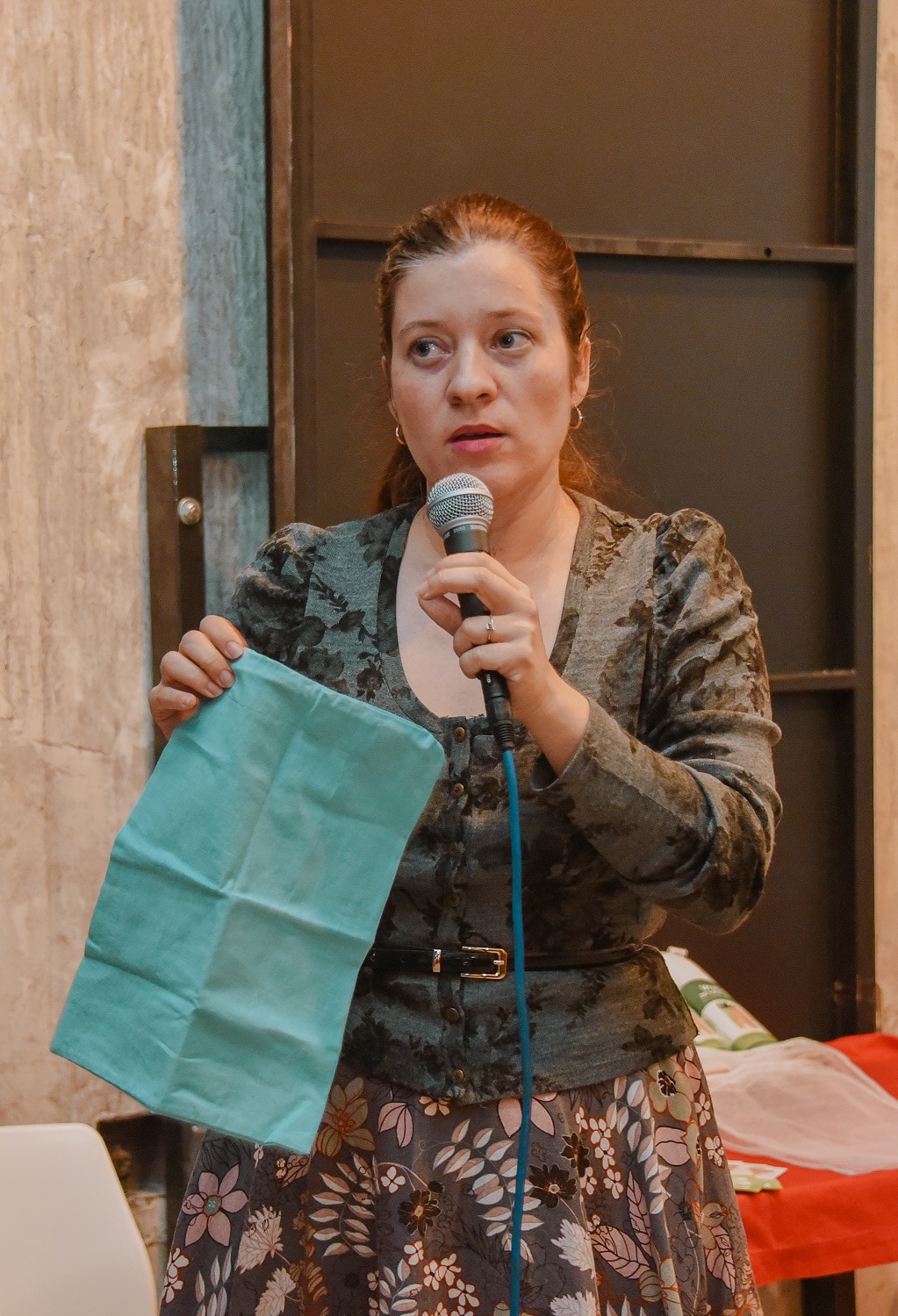
Presenting the principles of the zero waste movement and the circular economy, the administrator of the Facebook group “Zero & Low Waste Serbia” Milja Vukovic explained that she lives without waste for two years and that the time we are living in requires creative moves because species are being driven to extinction.
– There is clear data that says we are living in a special time and our oceans have several continents of floating plastic. Plastic in the natural environment is not neutral, its further effect is not zero. The plastic slowly decomposes, releases carbon dioxide and returns to the ecosystem through the animals that eat it – explained Vukovic, adding that the information influenced her to stop producing garbage and start communicating to others to do the same.
The participants of the networking meeting had the opportunity to attend an exhibition of some of the local products and creative solutions that replace plastic in everyday use, but also support the principles of the circular economy.

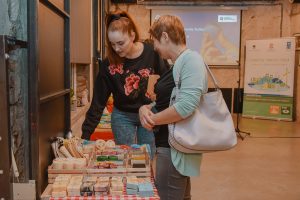


-
Nov 28 2019 This year in Serbia 300 kilometers of trucks full of special waste streams were recycled
New Law on Waste management soon will be adopted in Serbia, which will contribute to the sustainable development goals and enable to transfer part of the competence in this area the republic level to local self-governments, including the decision to ban plastic bags, announced the Minister of Environmental Protection Goran Trivan during event that mark The European Week for Waste Reduction on November 22 at the Museum of Science and Technology in Belgrade.
– The Waste Management Strategy has also been redefined and it is providing that we have 27 regional waste collection centres. We expect a series of changes that will show progress and when we make all the sites available, then the system of waste collection, treatment and reuse will come to life – Trivan said, adding that the Ministry has invested over 400 million dinars in the rehabilitation of non-sanitary landfills.
He pointed to the shortcomings of the existing Law, which does not provide a deposit system for packaging waste management.
– For the end of this year, we are preparing a document that will regulate the process of packaging waste treatment, which means that we will apply the experiences of countries that had great and good results and raise our goals to the level of EU targets – Trivan said.
According to the president of the Association of Recyclers of Serbia Vladimir Živaljević, since 2010. until today 600,000 tons of special waste streams have been processed in Serbia.
– This year, 100,000 tonnes or 100 million kilograms of special waste streams were processed. That’s 300 kilometres of trucks full of such a waste. It is easy to imagine how this has been around us for years – Živaljević said.
As he explained, waste oils are the big problem because is not known where they end up after use.
– There are 50 million litres of such waste oil in Serbia, for which is not known where it ends up, it is used in combustion plants and as a fuel in cars, so we have aerial pollution and carcinogens in nature. The solution is the „polluter pays“ principle. According to that principle, the polluter should pay for the rehabilitation of the polluted environment. This principle has shown results in the last few years and it provides significant stimulus for further progress in this area and according to the capacity, 20 to 30 per cent more waste could be processed than the current result – Živaljević explained and added that less than 2,500 companies have permits for some type of storage, transportation and waste treatment.
– We have 20 large operators, there are currently 1,000 workers in the industry and more than 15,000 workers in various companies that are subcontractors of these operators – Živaljević said.
Ambassador of the Kingdom of Sweden to Serbia Jan Lundin welcomed the great efforts of numerous municipalities in Serbia to reduce waste and recalled the numerous projects implemented by the Embassy in cooperation with the Republic of Serbia, in particular, the project with 17 municipalities in Serbia that have primary waste separation.
Ambassador of the Republic of Turkey Tanju Bilgic recalled the initiative launched in cooperation with the Ministry of Environmental Protection launched in Serbia „Zero Waste“.
The European Week for Waste Reduction is an international initiative that supports actions every year across Europe for one week, aiming to promote waste reduction and to raise public awareness of waste as a resource.
-
Nov 28 2019 The First Energy Cooperative In Serbia „Sunny Roofs“ Was Founded In Šabac
The first energy cooperative in Serbia „Solar Roofs“ was founded by the citizens in Šabac on November 6th. Public Utility Company for production and distribution of thermal energy “Toplana-Šabac”, Green Energy Cooperative (ZEZ) from Zagreb and United Nations Development Programme (UNDP) in Serbia within the project “Climate Smart Urban Development Challenge” helped to establish energy cooperative.
According to the director of PUC “Toplana-Šabac” Slobodan Jerotić, similar cooperatives already exist in the countries of the European Union and the first cooperative in Serbia is open to all who are interested, regardless of the place they live.
– The initiative came from a desire to show that it is possible to bring together people of similar interests around a good idea. The main goal is to implement a project that offers an alternative solution for municipal energy supply. By using renewable energy sources, in this case, solar energy, it is possible to reduce the use of fossil fuels, heating and electricity costs, but also significantly contribute to the reduction of greenhouse gas emissions – says Jerotić.
The cooperative will soon launch an investment crowdfunding campaign for the first project, the installation of a 16.5 kilowatt solar photovoltaic power plant on the roof of the PUC “Toplana-Šabac” administrative building. The investment is estimated at 15,000 euros. Techno-economic analysis and preliminary design have been completed. An application for a construction permit has been submitted through a unified procedure under the Law on Planning and Construction.
The director of “Toplane-Šabac” announces that the first kilowatt-hours of electricity could be produced in the first quarter of 2020. The energy produced from photovoltaic power plants, installed on the roofs of private homes and public buildings, generates revenue from the sale to energy entities engaged in electricity trading or savings if used for their own needs.
We would like to hear your opinion as well. You can fill in the questionnaire (available only in the Serbian Language) about your interest to invest in the construction of a solar power plant in Šabac on the link https://eesrbija.rs/upitnik/.
-
Nov 08 2019 Smart Bag and Green Reading Room won at Climathons in Subotica and Čačak
Global climate event, dedicated to addressing the climate challenges, was held in Subotica and Čačak on 25th and 26th October.
Within 24 hours six teams from Subotica, four from high schools and the other two from an IT company and an environmental civil society organization, came up with solutions to improve the waste management system in the city. The best innovation idea – Smart Bag – was devised by a group of students from the High School “Svetozar Marković” and the School of Economics “Bosa Milićević”. Their idea is to make a cotton bag with multifunctional benefits for consumers, as an incentive for people to carry their bags from home and abandon the use of plastic bags.
– We wanted to combine two challenges, textile and plastic waste. We did this by making our own bags out of used cotton and textiles, so that fabrics are not thrown away as waste. If our bag gets torn, it can be easily replaced with a new bag, so that the material circulates constantly. That would reduce waste and the use of plastic bags – explained Anđelka Matković from the first-ranked team.
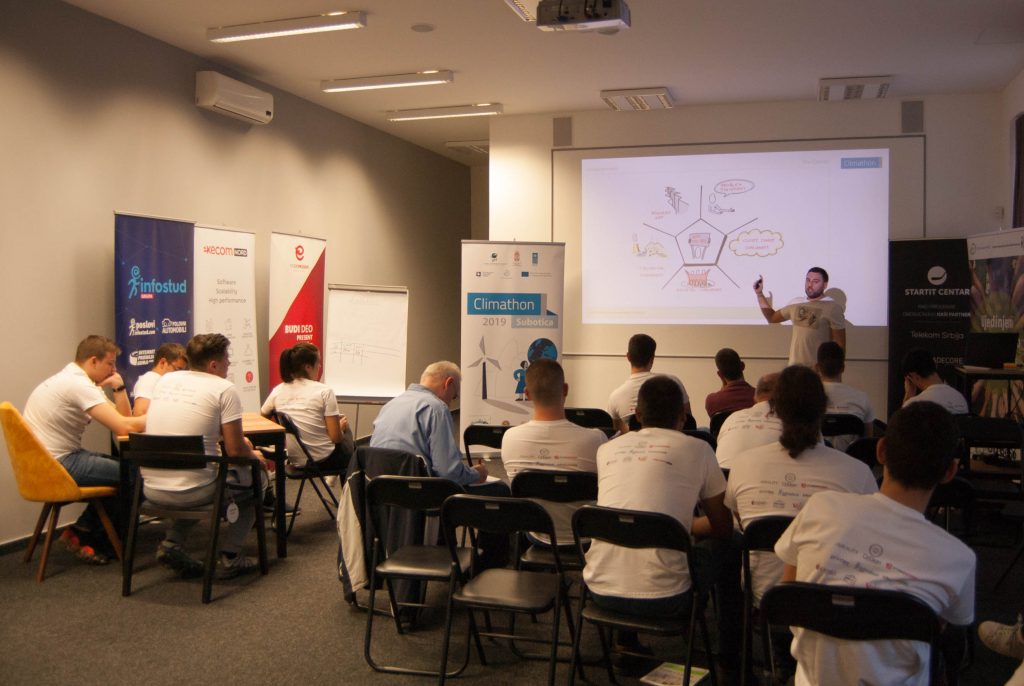
The “Gladiators” team won the second place, with a solution for two global challenges: massive logging and electronic waste. The idea is that device similar to a tablet, the “e-nout” would be rented to students at schools at a cost of around 1,000 dinars annually.
– This device would replace the notebooks because it could be written and read on, so that instead of printing books, publishers would simply transfer them to the device in a machine-readable format. Currently, one of the global problems is logging, with about 4.3 billion trees cut down annually for paper-making, and about 2,000 sheets of paper used daily in schools, and this would be an effective way to solve it – explained Stefan Bobić from “Gladiators” team.
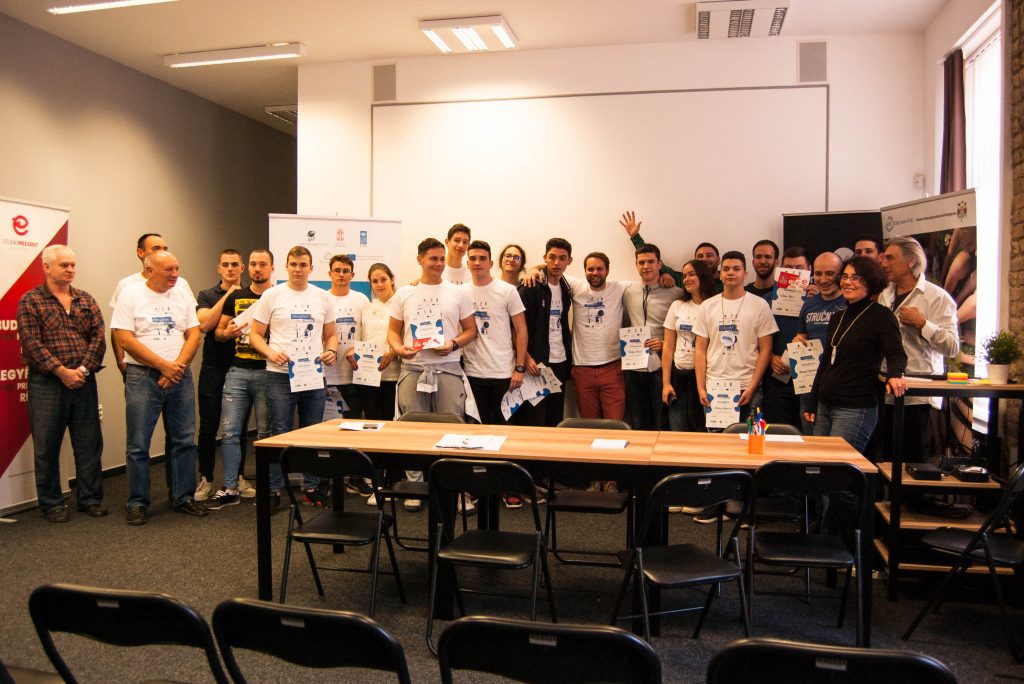
The invention of the team that won third prize is related to the recycling of electronic devices with a goal to improve the environmental awareness of citizens and environmental protection. The “Subo3ica” app enables users to gain information about where they can recycle their electronic devices, how to properly dispose electronic waste etc.
– It is an app that works on a local level, with various services available including routes of garbage trucks, placing ads for donation and reuse of appliances and similar information – said Stefan Popić, from the third-ranked team.
Other participants, though not awarded, also came up with interesting solutions and support for the realization of their ideas is in the planning. Realising their ideas would enable the reuse of glass in the production of souvenirs, the smart refrigerators that would notify users of the remaining food, while the recycled material would be used for the construction of roads.
Climathon in Čačak, themed “Green City”, was held in the Science and Technology Park. The challenge was to enrich and maintain existing green spaces in support of the fight against climate change. Question about how Čačak can be made a greener, more climate-resilient and a more pleasant city was answered by 28 participants in 7 teams.
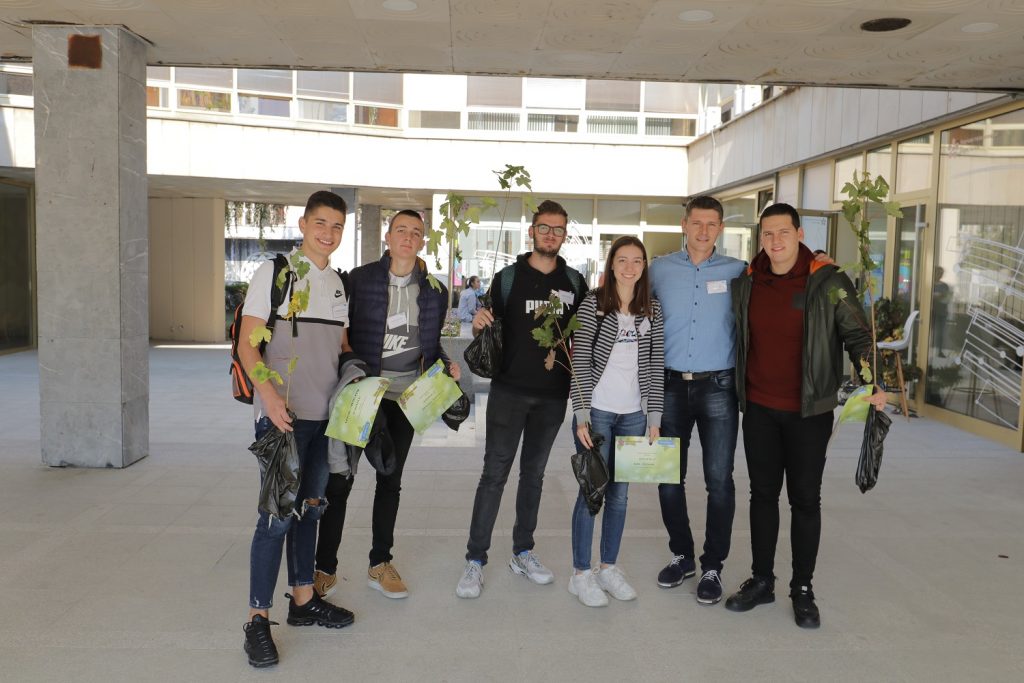
The “Čačak High School” team’s solution “Green Reading Room”won first place. Their idea is to green a part of the City Library roof and create a green reading room, a pleasant corner for the book-lovers. This new green space will improve the energy efficiency of the building and as reduce CO2 emissions and air temperatures in that part of Čačak.
The idea for the “Green Corner” – to arrange a plateau within the Cultural Center so that it fits the needs of the youth as a clean, green and healthy meeting place – by “Evergreen” team won the second place.
“Bambi” team won the third place with the “Green thread” solution, which proposes arranging terraces and neglected spaces between the House of Culture and City Hall, in order to make it greener and suitable for wedding ceremonies.
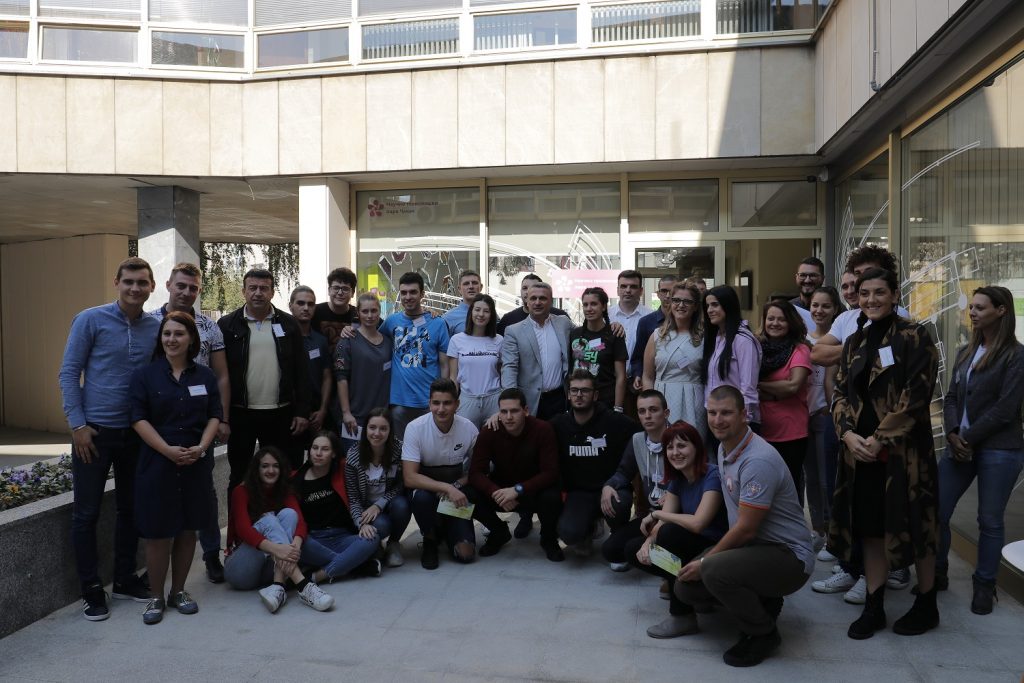
Other teams: “Energo town”, “ECoMETAr”, “Ecotopia” and “Green oasis” offered different solutions to make the city squares, streets and walls greener, and help the City of Čačak become more climate-resilient.
The Mayor of Čačak Milun Todorović announced the winners, and with the support of the State Enterprise for Forest Management “Srbijašume – the Čačak Forest Administration”, each participant received maple tree seedlings, with the obligation to plant the tree.
This year’s Climathon was also held in Belgrade, Novi Sad and Niš, as well as in more than 200 cities around the world.
Climathons in Čačak and Subotica were held within the project “Climate Smart Urban Development Challenge”, implemented by the Ministry of Environmental Protection and the United Nations Development Program (UNDP), with support of the Global Environment Facility (GEF) and in cooperation with Climate KIC Serbia.
-
Oct 23 2019 Climathon will be held in five cities of Serbia on October 25th
This year’s Climathon, a global event dedicated to address the climate challenges and involving more than 200 cities around the world, will be held on October 25th in Belgrade, Subotica, Čačak, Novi Sad and Niš. Participants organized in groups and with support of experts will be looking for sustainable solutions for climate challenges in a specific area in each city for 24 hours. The jury will select the most innovative ideas for awards.
The Climathon is established as a 24-hour festival that takes place in many cities in the form of hackathon competitions. During the competition, participants present innovative ideas and use new technologies to solve environmental and climate change problems.
The target groups of Climathon are high school students, university students, start-up community, NGOs and citizens.
Climathon in Čačak and Subotica is supported by the project “Climate Smart Urban Development Challenge” which implement Ministry of Environmental Protection with the support of the United Nations Development Program (UNDP) and the financial support of the Global Environment Facility (GEF) and by Climate KIC Serbia in Niš i Novi Sad.
-
Oct 19 2019 Climate Change Was One of the Most Important Topics of the 9th Belgrade Security Forum
The climate on Earth is changing rapidly and radically. The intensity of extreme weather events – heatwaves, forest fires, floods and droughts, have increased in the past 50 years. These occurrences have happened before, but on average once a decade, and today they occur every year or even several times a year. With the current average global temperature increase of approximately 1°C above the pre-industrial levels, it has become evident that we cannot reverse global warming during our lifetime. What we can is to stop global warming at 1.5-2 °C warmer than before pre-industrial level. These are the boundaries of what we, as a species, can adapt to. Weather conditions have already made people’s lives impossible in many places on the planet. Only in 2018, 17.2 million people have been displaced by climate-induced disasters in 148 countries and territories around the world.
The impact of climate change on security policy and economic and social development was the topic at the 9th Belgrade Security Forum, held from 16 to 18 October. At the panels “Climate Security: Adaptation, Mitigation, Change” and “Socio-economic Aspects of the Impact of Climate Change in Serbia” UNDP experts as well as experts from various fields of research and work that covers climate change discussed on the topic.
UNDP Resident Representative in Serbia Francine Pickup underlined that cities have a key role to play in fighting climate change, which is why at the recent UN Climate Change Summit in New York, leaders of states, private sector and civil society have launched numerous initiatives to transform cities into energy-efficient, inclusive and sustainable places to live. At the Summit, the youth took the front and center stage and sent a clear message that we are responsible for taking action immediately.
„More than half of the world’s population lives in cities and two-thirds will live in cities by 2050. Cities also produce more than 70 per cent of the world’s greenhouse gas emissions (GHG) and use 80 per cent of the world’s energy. They are the places where the effects of the climate emergency are already severely felt, particularly amongst the most vulnerable populations”, explained Pickup.
Serbia’s Minister of Environmental Protection Goran Trivan spoke about activities taken by Serbia to reduce GHG emissions and create climate-resilient urban communities.
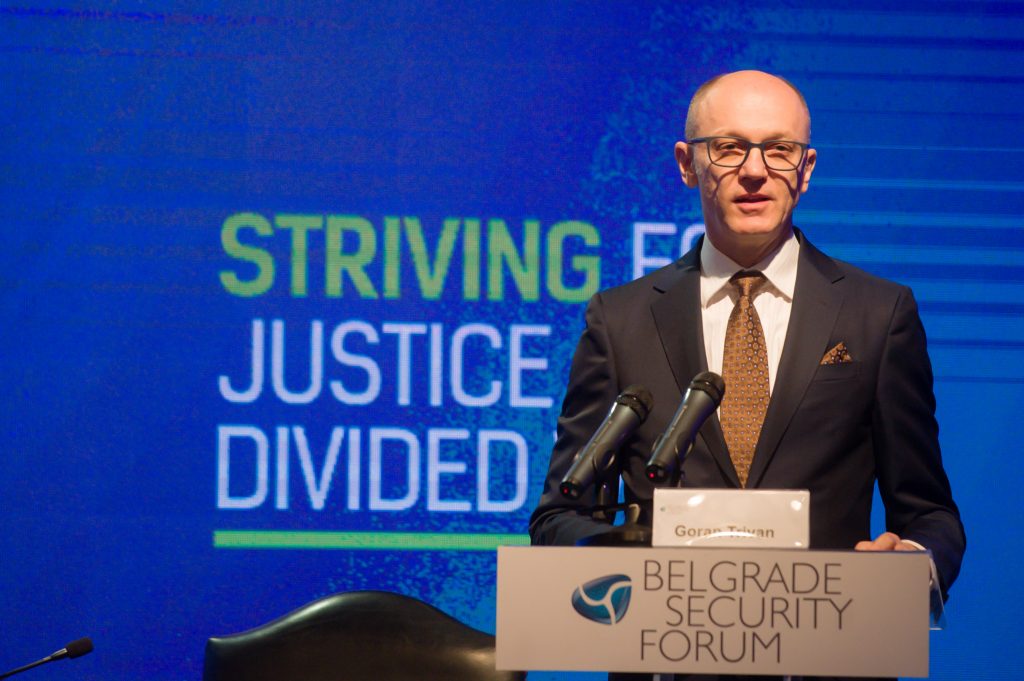
„The Ministry is working to establish an institutional, legislative and strategic framework to fight climate change. This implies the adoption of the Draft Law on Climate Change, which will serve as a basis for encouraging many activities. Also, a Draft Climate Change Strategy with an Action Plan has been prepared, which will determine the direction of low-carbon development and the path to reducing greenhouse gas emissions through specific mitigation measures. It is already evident that our ambitions to reduce GHG emissions under the Paris Climate Agreement will increase two to three times compared to 2015. In addition, as part of the revision of the Nationally Determined Contributions, Serbia will elaborate the aspect of adapting key economic sectors to the expected climate change, primarily in agriculture, water management, forests but also natural resources and public health protection“, explained Minister Trivan.
He recalled that, according to the data of the Statistical Office of the Republic of Serbia, 60 per cent of the population lives in cities in Serbia. However, this percentage will increase, as well as effects on the quality of life. Communities are expanding, but green spaces are decreasing. The number of vehicles on the streets, the amount of municipal waste and wastewaters and air pollution will increase as well as the consumption of energy for heating and cooling. All of this has the effect of increasing and intensifying the impact of climate change.
Associate Professor at the Meteorology Group at the Faculty of Physics, University of Belgrade, Vladimir Đurđević, pointed out the dangers and proportions of damage that global temperature rise of more than 2 degrees Celsius could bring.
“Our functioning on the planet depends on maintaining a stable climate. We are now outside the thermal optimum, but if we keep the temperature rise below 2 degrees, we could adapt to the changes that it brings. If we go above 2 degrees, the economy will be in a serious decline and we will trigger the so-called turning points in our climate system. A 1 degree increase in temperature has lasted for more than 100 years, while a new 1 degree increase will occur in just 30 years”.
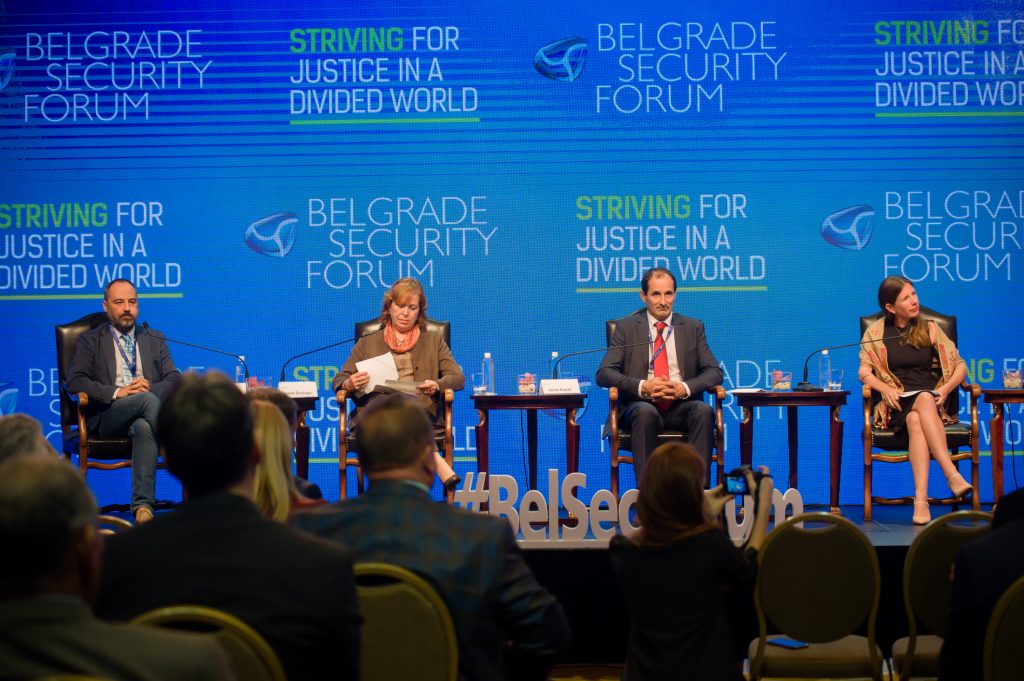
Đurđević stressed that we can expect a decrease in rainfall during the summer and therefore intense droughts. He noted that the last couple of years have seen 5 heat waves during the summer, unlike the previous decades, and that torrential city floods are much more risky because of the infrastructure that is built for stable weather.
The World Health Organization Data from shows that climate change also causes numerous health problems. Director of the Regional Office of the World Health Organization for Europe Nedret Emiroglu believes it is important to raise awareness about the impact of climate change on health and find new solutions as the intensity and frequency of communicable diseases increases.
Human health is also endangered by the coal-based energy production. Director of the Energy Community Secretariat Janez Kopač recalled that the entire Western Balkans region is significantly dependent on coal-fired power plants:
„One of the solutions would be installing filters in the power-plants, as well as introducing tax for CO2 emissions, as they do in the rest of European countries. That way air pollution and overall environmental contamination would reduce, but the problem of implementing these solutions comes down to absence of political will in the region“.
Significant initial investments are needed to strengthen the resilience to climate change, but if nothing is done – costs will only rise, said Portfolio Manager for Climate Change in UNDP Serbia, Miroslav Tadić. He recalled that Serbia has lost about six billion dollars in floods and droughts since 2000 through damage:
“For that money, we could build, for example, the necessary facilities for wastewater treatment and water supply in accordance with EU standards”.
Tadić concluded that investing in mitigation and adaptation is at the same time an opportunity for further development of the economy, new jobs and economic progress of the society.
“The consequences of climate change will be there, no matter if we approve or disapprove of its existence. Residents of urban and rural areas will be equally threatened by the effects of climate change, only in different ways”, said climate change expert in Serbia Danijela Božanić.
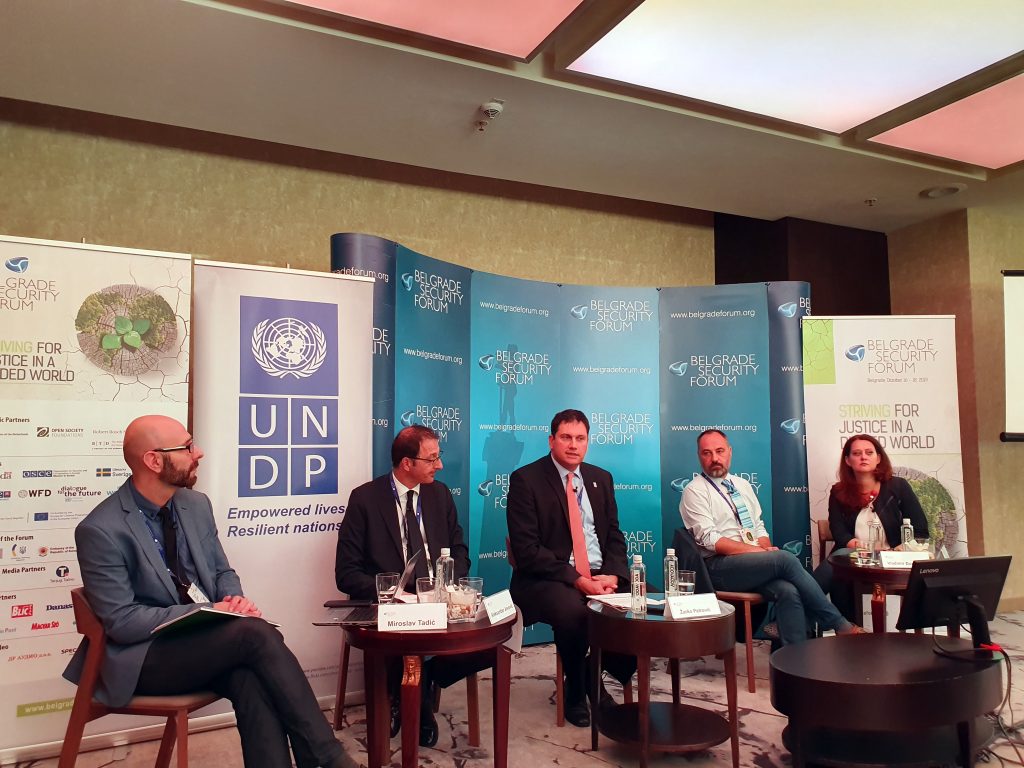
The panellists noticed that Serbia has signed and ratified vital agreements on climate change and climate protection, but that there is no adequate implementation of these agreements in practice. Experts agreed that waste management, recycling and investment in scientific research, combined with joint regional and international efforts, should be the key priorities.
The panel “Climate Security: Adaptation, Mitigation, Change” was supported by the United Nations Development Program (UNDP) and participated by UNDP Resident Representative in Serbia Fransine Pickup, Minister for the Environmental Protection Goran Trivan, Associate Professor in the Meteorology Group at the Faculty of Physics University in Belgrade Vladimir Đurđević, Director of the World Health Organization (WHO) Regional Office for Europe Nedret Emiroglu and Director of the Energy Community Secretariat Janez Kopač.
The panel “Socio-economic Aspects of Climate Change Impact in Serbia”, also held in partnership with UNDP, was participated by UNDP Climate Change Portfolio Manager Miroslav Tadić, Faculty of Mechanical Engineering at University of Belgrade Aleksandar Jovović, Associate Professor in the Meteorology Group of the Faculty of Physics at University of Belgrade Vladimir Đurđjević, Climate Change expert Danijela Božanić and Team Leader on Resilient Development in UNDP Serbia Žarko Petrović.
-
Oct 11 2019 Cities are crucial for the fight against climate change
Best practices and solutions for development of climate-smart cities across Europe were presented today at the event „Citizens Build Smart Cities“ in Belgrade, organized by the Ministry of Environmental Protection and the United Nations Development Program (UNDP), with support from the Global Environment Facility (GEF) ), in partnership with Adria Media Group.
The event was opened by Minister of Environmental Protection Goran Trivan, Head of the Sector for Cooperation of the Delegation of the European Union to Serbia Yngve Engstrom and UNDP Resident Representative to Serbia Francine Pickup.
Ms. Pickup emphasized that cities have a key role to play to the fight climate change, which is why at the recent UN Climate Change Summit in New York, leaders of states, private sector and civil society have launched numerous initiatives to transform cities into energy-efficient, inclusive and sustainable places to live. At the Summit, the youth took the keynote and sent a message saying that we are responsible for taking action immediately.
„More than half of the world’s population lives in cities and two-thirds will live in cities by 2050. Cities also produce more than 70 per cent of the world’s greenhouse gases emissions and use 80 per cent of the world’s energy. They are the places where the effects of the climate emergency are already severely felt, particularly amongst the most vulnerable population“, explained Pickup.
She recalled a joint initiative of the Ministry of the Environmental Protection and the UNDP, which with the support of the Global Environment Facility, supports innovative solutions to reduce the emissions of GHG in Serbia:
„UNDP works with the national and local governments to translate global and national climate goals into concrete actions. The Ministry and UNDP awarded the five most advanced solutions which implementation will cut around 500.000 tons of CO2 for Serbia, which equals planting trees on a territory of 145 football fields. These five innovative technological solutions and business models will also increase the use of renewables, improve resource and energy efficiency, tackle urban food waste and build smart city infrastructure“, said Pickup.
Serbia’s Minister of Environmental protection Goran Trivan spoke about activities taken by Serbia to reduce GHG emissions and create climate-resilient urban communities.
„The Ministry is working to establish an institutional, legislative and strategic framework to fight climate change. This implies the adoption of the Draft Law on Climate Change, which will serve as a basis for encouraging many activities. Also, a Draft Climate Change Strategy with an Action Plan has been prepared, which will determine the direction of low-carbon development and the path to reducing greenhouse gas emissions through specific mitigation measures. It is already evident that our ambitions to reduce GHG emissions under the Paris Climate Agreement will increase two to three times compared to 2015. In addition, as part of the revision of the Nationally Determined Contributions, Serbia will elaborate the aspect of adapting key economic sectors to the expected climate change, primarily in agriculture, water management, forests but also natural resources and public health protection“, explained Minister Trivan.
He reminded that, according to the data of the Statistical Office of the Republic of Serbia, 60.8 per cent of the population lives in cities in Serbia. However, this percentage will increase, as well as effects on the quality of life. Communities are expanding, but green spaces are decreasing. The number of vehicles on the streets, the amount of municipal waste and wastewaters and air pollution will increase as well as the consumption of energy for heating and cooling. All of this has the effect of increasing greenhouse gas emissions and intensifying the impact of climate change.
„The population of cities is demographically younger than in the other settlements, which makes it a driving force that we must count on to develop in the future. Younger generations are using modern technology from a very young age. And their innovative usage has proven to be crucial for greater engagement in developing climate-resilient cities“, concluded Trivan.
By the end of the year, a new European Green Deal will be presented. The goal is to increase EU 2030 GHG emission reduction target towards 55 % up from the 40% currently agreed, announced Head of the Sector for Cooperation of the Delegation of the European Union to Serbia Yngve Engstrom.
„The measures we will take within this Deal will be aimed at protecting biodiversity, reducing pollution and GHG emissions, strengthening the circular economy and tax measures consistent with these measures. The EU donated € 400 million so far for environmental protection in Serbia. We support the alignment of legislation with the EU, as well as development of a new Climate Law and Climate Strategy, which should be adopted by the end of the year“, said Engstrom.
Experts from Italy, Bulgaria, Finland, Northern Macedonia and via live streaming from London, Maribor, Milan, Helsinki, Madrid have presented the concrete measures to fight climate change and to develop sustainable cities. Throughout the Panels, more than 100 participants had the opportunity to hear experts’ experiences on innovative approaches, technical solutions, new technologies, open data, circular economy and development strategies that will contribute to the creation of climate-smart and sustainable cities and municipalities. Representatives of public and private companies presented the realized infrastructure solutions for the development of smart cities
Within this event, workshops were held on the topic of open data and an alternative way of financing projects, while the Fair of Ideas, Technologies and Business was held at Manjež Park.
The event was organized as part of a five-year “Climate Smart Urban Development Challenge” project, which contributes to making local communities and cities in Serbia more resilient to climate change through the development of projects to reduce greenhouse gas emissions through partnerships between the public, private and civil sectors. The Ministry of Environmental Protection implements the project with the support of the United Nations Development Program (UNDP) and the financial support of the Global Environment Facility (GEF). The project partners are the Delegation of the European Union to the Republic of Serbia, the Government of the Kingdom of Sweden, the Government of Switzerland, Innovation Fund and the Standing Conference of Cities and Municipalities.
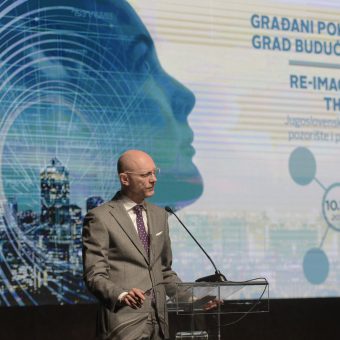
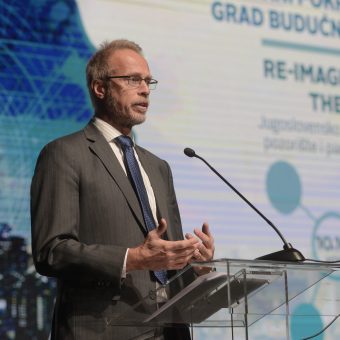
-
Oct 07 2019 Welcome to the conference “Citizens Build Smart Cities”
We are inviting all interested stakeholders to the knowledge-sharing conference “Citizens Build Smart City/Re-imagining the city”. Event will take place on Thursday the 10th of October, at the Jugoslav Drama Theatre (50 Kralja Milana Street, Belgrade) starting at 10:00 a.m.
The United Nations Development Programme (UNDP) in Serbia, acting as an implementing agency of the Global Environment Facility (GEF), is supporting the Ministry of Environmental Protection (MoEP) in implementing the five-year “Climate Smart Urban Development” Challenge project, jointly financed by the GEF, MoEP and partners.
An interactive event “Citizens Build Smart Cities/Re-imagining the City” will be held in order to accelerate the change towards climate – smart communities. The one-day open event aims to motivate and connect citizens, the private sector and local authorities to initiate the necessary transformation. Demonstrating the potential, we invite citizens and other stakeholders to join and start building common infrastructure.
The Conference is organized around three stages:
- Main stage (representatives of smart cities from around Europe present the best practices and solutions in open panel discussions),
- Smart stage (practical learning through workshops on open data and alternative financing with international and lecturers from Serbia),
- In the Zone (fair of ideas, new technologies and business models open to all citizens).
Conference Agenda and more information you can find on: http://gradovi-buducnosti.adriamediagroup.com/
-
Apr 22 2019 Five climate-smart projects receive funding for implementation in Serbia
The Ministry of Environmental Protection and the United Nations Development Program (UNDP) presented the results of the Climate Incubator and allocated funds for the implementation of innovative technology solutions and business models for reducing greenhouse gases in five municipalities and cities, but also throughout Serbia because of the high possibility of replication.
The grants for the co-financing of technological solutions and business models were granted to the following companies: JKP Toplana Šabac, Eso Tron, Jugo-Impex d.o.o, Sanicula d.o.o. and GreenEnergy Point d.o.o. Implementation of their ideas will contribute to the increase of energy and cost efficiency, increase in the share of energy produced from renewable sources, stimulate circular economy and improve waste management throughout Serbia, especially in Nis, Paracin, Boljevac, Rumenka, Sabac.
The representatives of five winning teams have signed agreements and funds were allocated to co-finance the implementation of their five projects. The total value of the awarded grant is $ 470,000, and the total investment value is about $11,000,000. The expected reduction of the greenhouse gas emissions, over the life span of the awarded projects, is 500,000t CO2 equivalent, or, to illustrate, just as much as if we planted 115,000 trees or afforested areas the size of 145 football stadiums.
“‘Climate Smart Urban Development Challenge’ is one of the most important projects the Ministry of Environmental Protection implements because it entails expertise, financial support, innovation and concrete results,” said Minister Goran Trivan. „Serbia has been polluted long enough, we want to solve the environmental issues together and through concrete actions. The Ministry will continue to support innovative ideas and new technological solutions that will give tangible results in the fight against climate change, but will also improve the overall quality of the environment,” Minister Goran Trivan emphasized at the signing ceremony.
“UNDP supports the development of innovative ideas through the Climate Incubator, as well as their implementation, so as to contribute to the climate change mitigation and sustainable development in Serbia. Addressing climate change also makes good business sense. Reduction of greenhouse gas emissions saves money because it improves energy and operational efficiency, reduces production costs and enhances product sales, making them more competitive,” said UNDP Serbia Resident Representative a.i. Steliana Nedera.
Public call “Innovation Challenge”, announced within the Climate Smart Urban Development Challenge, joint project of the Ministry and UNDP, has helped to identify and source innovative, climate smart development ideas and projects that reduce greenhouse gas emissions and support the climate resilience of local communities in Serbia. In addition to initial financial support, the award-winning innovators had the opportunity to develop their ideas into the mature projects ready for implementation, in the “Climate Incubator/Accelerator” established within the project.
-
Apr 01 2019 Mayors’ initiative to increase the usage of solar energy
UNDP together with Citizenergy platform, the European aggregator platform of all sustainable energy crowdfunding platforms and Energy Cities Europe, welcomed mayors from eight countries: Moldova, Serbia, Georgia, Tajikistan, Croatia, Somalia, Lebanon and Portugal, in order to launch an initiative for promotion of new financial models for solar power projects. Local communities, which are included in Climate Accelerator of the “Climate Smart Urban Development Challenge” project, presented their projects in Lisbon, on March 18 and 17. On the occasion, representatives of the cities welcomed the mayors’ platform for boosting solar energy, called “Solar Mayors platform”.
Given that the potential of solar energy usage is increasing, due to constant technology developments, as well as affordability of solar panels due to decreasing prices in the last decade, it is necessary to find new financial models and form a platform for the exchange of experiences. For that reason, the “Solar Mayors platform” has been launched, where all the participants will have an opportunity to learn about the latest trends in the usage of solar energy, share best practices and promote citizen engagement in the usage of renewable energy sources. The platform should establish cooperation between the local and national levels, involve civil society organisations, private sector and citizens in increasing transparency and efficiency of institutions, and encourage innovation and cooperation of all stakeholders.
New financial models such as crowdfunding, energy cooperatives, cryptocurrencies (SolarCoin) and energy service companies financed by savings (ESCO) were presented during the event and it is expected that these models will support the increase of solar energy production in cities.
The participants of the workshop included representatives from the city of Kragujevac, Niš and Šabac, who gained valuable knowlegde about crowdfunding campaigns, which they plan to implement during this and next year in order to purchase solar panels and install them on public building roofs. Depending on the type of projects, it is planned to raise funds through donation crowdfunding for projects in Kragujevac (kindergarten Zeka) and Šabac (Center for children and youth), while the funds for procurement of solar panels for the public utility company “Toplana Šabac” will be secured through investment crowdfunding. Representatives of these cities are the first who joined the “Solar Mayors Club” which provides them with an opportunity to connect with other cities, exchange experience in crowdfunding campaigns and support implementation of similar projects in other cities in Serbia.
